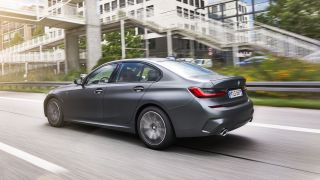If you’re planning to drive into the centre of London or Birmingham, you may find your car automatically switches you into its fully electric mode.
It’s due to the introduction of BMW’s eDrive zones, which geo-fence London and Birmingham and sees compatible hybrid cars automatically switch mode as you cross a geographical border.
While this is the first time the technology has come to Britain, BMW has been rolling it out in a number of other European cities since March, with 80 zones currently set up across the continent.
For now, the only plug-in hybrid cars compatible with the eDrive zone technology are the BMW 330e, BMW 530e, BMW 745e and BMW X5 xDrive45e, where it’s a standard feature. BMW says it will launch additional compatible models in the future.
BMW also says the technology is available for car manufacturers to use, so we could see it roll out to more vehicles outside of the BMW and Mini ranges in the future, if rivals decide to borrow the functionality.
How do BMW eDrive zones work?
As we mentioned at the start, the geo-fencing technology works with the car’s in-built GPS to determine where the eDrive zones start and stop.
In London, it covers “the same geographic area as the TFL Congestion Charge/ULEZ zone”, while in Birmingham “the service covers the city’s planned Clean Air Zone, which is due to be implemented in 2021.”

As your plug-in hybrid crosses one of these digital eDrive zone borders, the vehicle’s intelligent system will automatically switch from petrol mode to fully electric mode.
This can be taken a step further if you input your journey into your car’s navigation system.
With the car able to see your entire route, it can prioritise using the combustion engine for the part of the journey outside the eDrive zone, while also managing power consumption to ensure the battery has as much charge as possible by the time you reach the boundary of the zone, ready for the fully electric mode.
The hope is that this automatic switch to a fully electric car mode when drivers enter busy city centres will help reduce the emissions in these areas. During a trial of the service in Rotterdam, Netherlands earlier this year, BMW said it saw 90% of the urban miles driven were electrified, rather than powered by a traditional combustion engine.
BMW isn’t stopping with just London and Birmingham, and it says it’s looking to roll out the service to more UK locations in the future.
As the number of zones, and the number of compatible vehicles increases over the coming years, this type of technology could help greatly reduce the total carbon emissions generated by drivers – although there is a long way to go before it becomes a standard feature in the majority of vehicles.
